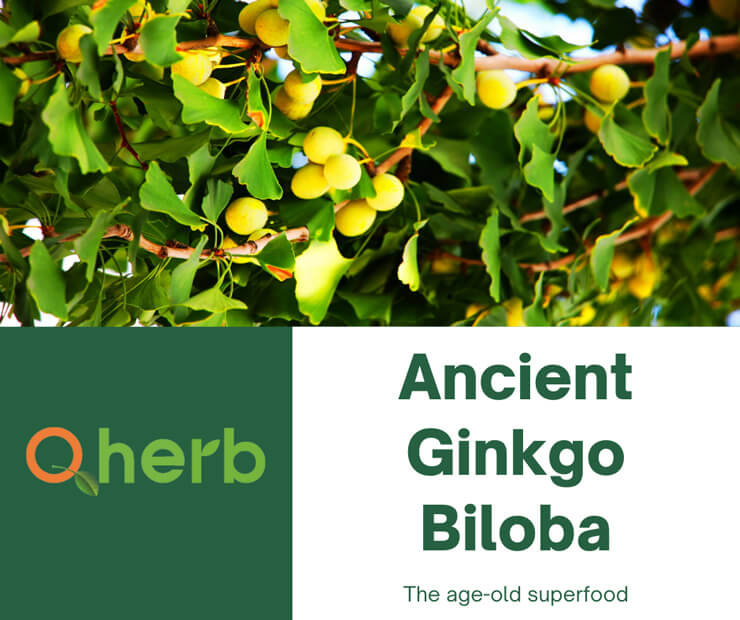Ginkgo Biloba is a famous supplement and one of the top-selling medicines under herbs. The dried green fan-shaped leaves of this plant are used to extract the Ginkgo Biloba. It is available as capsules, tablets, and liquid extracts.
The tree of Ginkgo is known as a living fossil; which means that it has the potential to be alive even after a major extinction.
- History
It has been claimed by the Missouri Botanical Garden, that Ginkgo Biloba is the only ancient plant to be inhabited on earth, up to 150 million years ago.
Ginkgo Biloba was introduced very early to humans. The trees were naturally cultivated for human consumption and in the form of traditional medicine.
In Ancient China, it has been used as traditional medicine. Chinese people took advantage of its cognitive benefits and reduced symptoms of asthma. They often are the nuts of ginkgo because of their strengthening properties.
According to the Institute of Natural Products Research, there are some other traditional uses of Ginkgo Biloba-
- Soothing bladder irritation
- Increasing sexual energy
- Preventing bedwetting
- Treating gonorrhea
- Treating intestinal worms
- Introduction to the Western World
Elbert kaempfer, an European has discovered ginkgo in the latter part of 1600s. In 1771, it was finally named Ginkgo Biloba which means “silver plume with two lobes”
Later in 1784, it was brought to the garden of William Hamilton in America.
- Therapeutic Properties of Ginkgo Biloba
- The therapeutic properties of this plant include the treatment of memory problems, and blood disorders, to improve eye health and cardiovascular health.
- It contains a high amount of terpenoids, flavonoids, and antioxidants that protect against cell damage, which generally happens due to harmful free radical production. By this process, antioxidants also work to reduce the risk of cancer.
- Ginkgo is also known as the maidenhair tree, one of the oldest species of tree in the globe.
- The extract of this plant can be used as a supplement and the dried leaves can often be used to make tea. There is little evidence that confirms the positive effect of this extract on dementia. The benefits may include-
- A better social behavior
- Improved memory and thinking
- Better ability to perform everyday tasks.
- One study has found Ginkgo Biloba extract called EGb 761 is effective in treating Alzheimer’s disease.
- It improves cognitive functions as consumption of Ginkgo Biloba induces blood circulation in the brain, hence protecting it from getting damaged and also saving other organs of the body.
- People who are suffering from glaucoma may show better vision results if, consumed 120mg of Ginkgo for eight weeks. To keep the sight for the longer term, people with macular degeneration often use its supplements.
- Dosage and availability
Ginkgo is available in the form of liquid extracts, tablets, capsules, dried leaves, and teas.
In divided doses, adults have been taking between 120 to 240 mg a day. It takes around 4 to 6 weeks for the signs of improvement. It is not advised to take its leaf in raw or roasted form, as it could be poisonous.
- Who should avoid taking it?
- Children
- Breastfeeding or pregnant women
- Individuals taking blood thinners
- Those with epilepsy
- People suffering from diabetes should consult their physician before including it in their medications.
- How to prevent the interactions of drugs?
Well, ‘With any sort of medicines, care must have been taken to prevent interactions with other medicines and risks’. Even, if ibuprofen is combined with ginkgo, may increase the chance of internal bleeding. Larger doses of ginkgo toxins can result in seizures. Ginkgo toxins are generally present in the seeds of this plant or the leaves to a lesser extent. So, there’s always a likelihood, that it could reduce the work function of the anticonvulsant drug. Coagulants including aspirin, or patients with blood circulation disorders should avoid taking it with their standard medicines. People who are taking serotonin reuptake inhibitors in the form of antidepressants should avoid ginkgo as it may inhibit the effectiveness of the medicines.
- Some interesting facts about Ginkgo Biloba
- It is a top-selling supplement.
- It may efficiently work with cognitive functions.
- The traditional uses include an increase in sexual energy, and in soothing the bladder infection.








